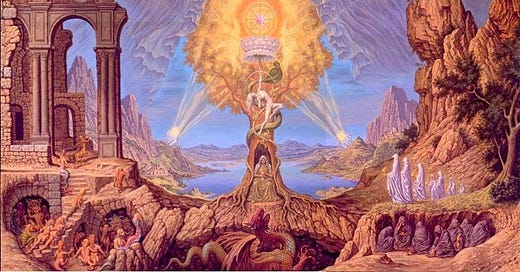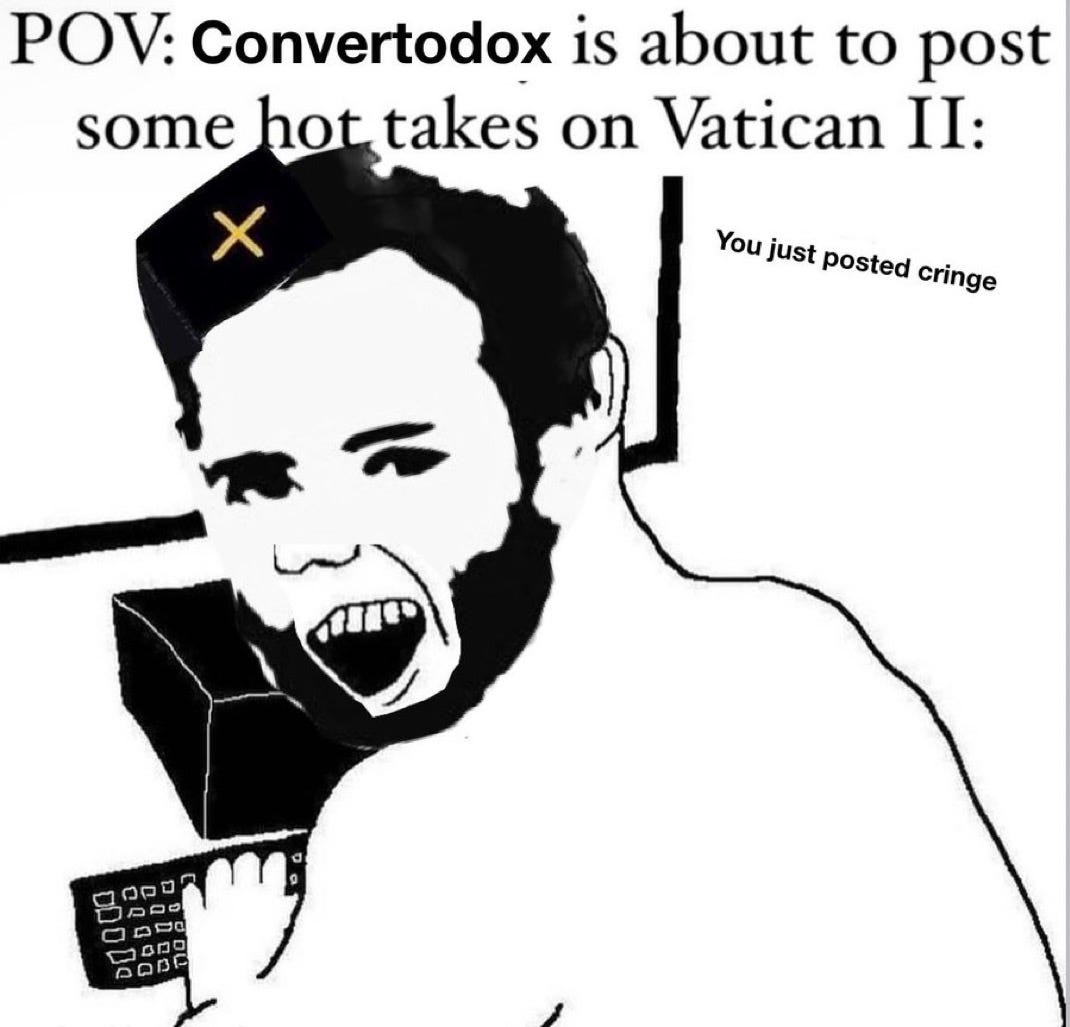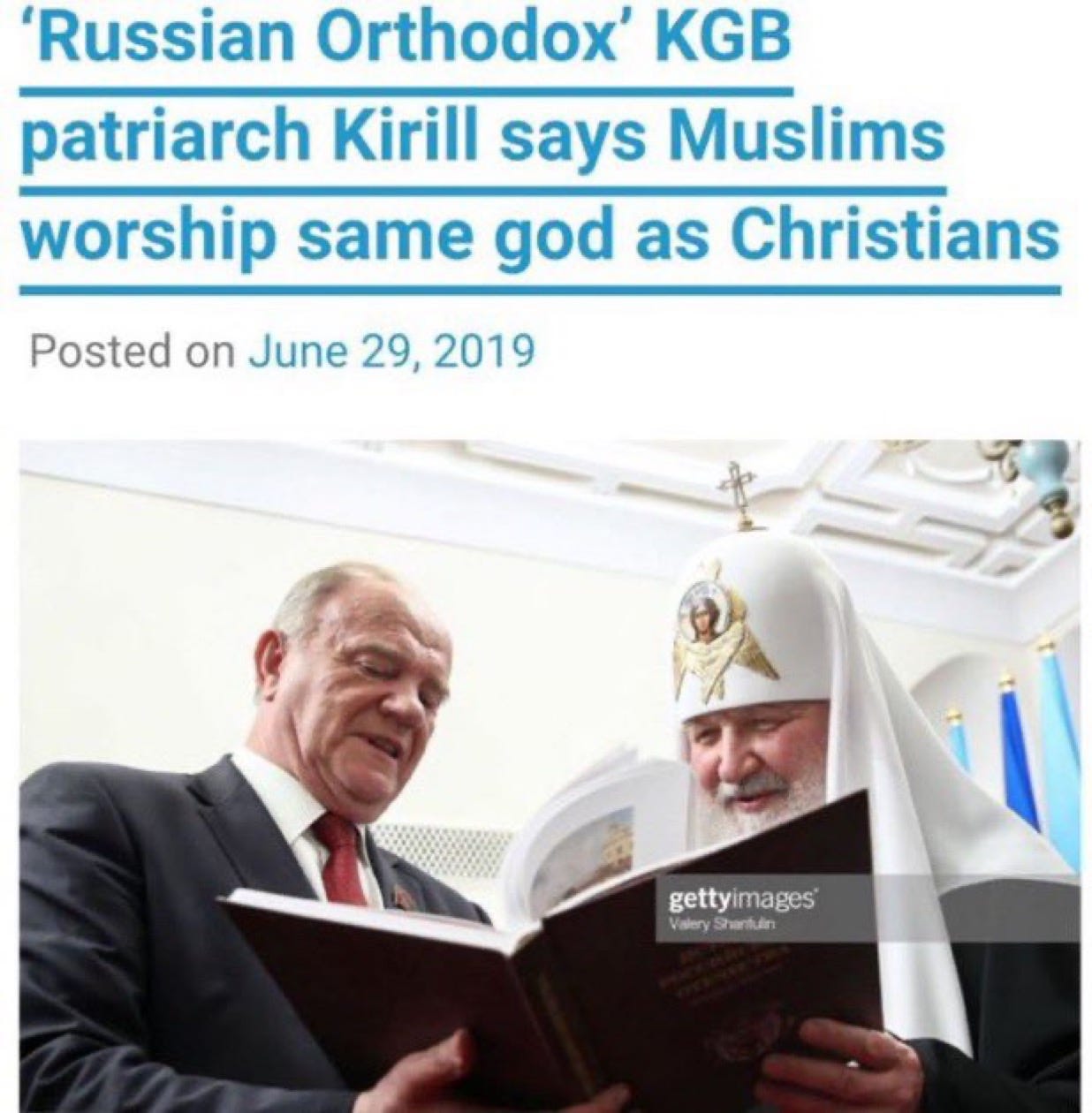Orthobro Gnosticism
How Jay Dyer and Orthodox Luigi's position on Natural Theology is an amalgamation of ancient heresies, and their ecclesiology appears to be a sort of Eastern Rite Anglicanism
Ironically, some Orthodox today are more theologically determinist than John Calvin himself. In denying that Muslims, or anyone outside visible Christianity, can worship God, they assert a view of divine revelation so utterly exclusive that it borders on total fatalism.
John Calvin taught double-predestination - that God creates some for the purpose of damnation. It is harsh and unbiblical, but even Calvin allowed that God could work mysteriously among the unevangelized.
The Orthodox “hardline” position is that Muslims and Jews cannot in any way worship the true God or respond to grace, because they reject the Trinity, which is something only known by Divine Revelation. This implies that no one outside visible Christianity is even capable of responding to God, not even by natural theology, conscience, or sufficient grace. Keep in mind Romans 1:20 says God can be known easily through nature and natural reason. The Trinity cannot, as it is only known by Divine Revelation.
As Romans 1:20-21 says:
Ever since the creation of the world his invisible nature, namely, his eternal power and deity, has been clearly perceived in the things that have been made. So they are without excuse; for although they knew God they did not honor him as God or give thanks to him, but they became futile in their thinking and their senseless minds were darkened.
“Orthobro Jay Dyerite” theology, shared by such “luminaries” as OrthodoxLuigi, Rachel Wilson and many others, is more deterministic than the Catholic view, which rejects indifferentism and pluralism, but upholds that God gives sufficient grace to all, and that worship can be rightly ordered, even outside full revelation.
Romans 2:14-16 says:
When Gentiles who have not the law do by nature what the law requires, they are a law to themselves, even though they do not have the law. They show that what the law requires is written on their hearts, while their conscience also bears witness and their conflicting thoughts accuse or perhaps excuse them on that day when, according to my gospel, God judges the secrets of men by Christ Jesus.
In speaking with Greek pagans in Athens, St. Paul in Acts 17:23 says:
For as I passed along, and observed the objects of your worship, I found also an altar with this inscription, ‘To an unknown god.’ What therefore you worship as unknown, this I proclaim to you.
Some Orthodox today deny Muslims worship the true God, even by natural light. That’s more deterministic than Calvin, who at least acknowledged God’s mysterious work beyond formal revelation.
When you deny natural theology, you deny the Fathers and Sacred Scripture. Natural theology is sufficient grace.
God has made Himself knowable through creation, conscience, and reason. It’s how God can save individuals despite their personal circumstances, even folks in North Korea or Somalia who might never hear of Christ. While it is not saving grace, it is sufficient to move the heart to seek Him, and to make rejection culpable. This is what Romans 1:20 is referring to when it says “they are without excuse.”
Why? Because the knowledge of God through creation and reason is sufficient to obligate belief and worship.
Man can know natural truths without grace, but cannot reach supernatural ends without it. But he can be moved to seek truth through natural knowledge, and predispose his heart to receive saving grace, even without the intellectual means to know and articulate divine revelation properly.
In the Dogmatic Constitution Dei Filius (Vatican I), it says:
The same Holy Mother Church holds and teaches that God, the beginning and end of all things, may be certainly known by the natural light of human reason, by means of created things; "for the invisible things of Him from the creation of the world are clearly seen, being understood by the things that are made" (Romans 1:20), but that it pleased His wisdom and bounty to reveal Himself, and the eternal decrees of His will, to mankind by another and a supernatural way: as the Apostle says, "God, having spoken on diverse occasions, and in many ways, in times past, to the fathers by the prophets; last of all, in these days, has spoken to us by His Son" (Hebrews 1:1-2).
St. Augustine once wrote:
You have made us for Yourself, O Lord, and our hearts are restless until they rest in You.
This restlessness begins with the natural movement toward the divine.
Natural theology = sufficient grace in the moral order. It gives man the ability to seek God and be drawn to Him.
It does not replace divine revelation or the sacraments, but it condemns rejection of God, and predisposes one to receive saving grace, if cooperated with.
If someone cooperates with sufficient grace, he could receive saving grace without knowing Christ formally, or being a formal member of any Christian group, due to invincible ignorance.
If someone cooperates with sufficient grace - the light of reason, conscience, and natural law - then God can, in His mercy, grant them saving grace, even if they do not know Christ.
CCC 847:
Those who, through no fault of their own, do not know the Gospel of Christ or His Church, but who nevertheless seek God with a sincere heart… may achieve eternal salvation.
To equate salvation with knowledge of correct doctrine is to revive the ancient Gnostic heresy that knowing secret truths saves. The Church has always condemned this. Saving faith may grow into knowledge, but is not dependent on it. The Trinity is a truth hidden to natural intellect, and again, only known by Divine Revelation.
It’s already known that Orthobro theology has a heavy component of Donatism. Now we see that it contains Gnosticism and Pelagian Rigorism, and like many strands of Evangelical Christianity is simply a golem of ancient heresies.
Saving faith is not intellectual gnosis. It is a theological virtue infused by God, even in baptized infants. To claim you must consciously know the Trinity to even know who God is, much less to be saved, is to inadvertently deny the effectiveness of infant baptism and embrace a completely Gnostic soteriology.
In their rejection of infused virtue and divine initiative in salvation through nature, certain strands of modern Orthodox online apologetics resemble Evangelical fundamentalism more than Apostolic Christianity. It is no coincidence that they are nearly all former Evangelicals and Baptists.
A lot of “Orthobro” theology isn’t ancient Orthodoxy, it’s Donatism + Gnosticism + Pelagianism surrounded by beautiful liturgy, icons and cassocks.
They demand knowledge (gnosis) for salvation, deny sacraments outside their camp, and reject divine initiative through nature.
Protestants discerning Orthodoxy and Catholicism should now clearly see that Catholicism is the true faith and the clearly superior answer, at least to Orthobro theology.
Now I want to be fair to our Orthodox Brothers and Sisters. Not all of them are Orthobros. What I am attacking here is the unlearned and irrational opinions of lay Orthodox converts who have taken it upon themselves, often without the blessing of any bishop, to teach Orthodoxy, and often do so wrongly and defame their own Patriarchs and official teachings.
According to the Orthodox Social Ethos document, section 58, formally and personally endorsed by Ecumenical Patriarch Bartholomew, it says:
The story of other non-Orthodox Christian religious traditions is not yet finished, and Orthodoxy affirms that like other non-Orthodox Christian bodies they only find their coherence and clarity within the Orthodox Church. As for other religions, the Orthodox Church takes encouragement from the words of the Apostle Paul to the Athenians at the Areopagus: “What therefore you worship as unknown, this I proclaim to you” (Acts 17:23). From this the Church is given license to proclaim that the true God in whom all humanity lives and moves and has its being is worshipped by peoples everywhere, Christian and non-Christian alike. And this makes her only more eager to make all persons and peoples aware that the face of this one true God shines forth unobscured in the face of Jesus Christ.
Sections 56 and 57 of the same document speaks of Muslims and Jews as worshippers of God, not pagans.
Patriarch Kirill has also personally affirmed that Muslims and Jews worship God, on several occasions.
Orthobros will typically follow up on this by claiming that they do not have the same ecclesiology as Catholicism, catastrophically misunderstanding Orthodox ecclesiology, and showing that the Orthodox Churches need to clean up their catechumen programs and include more instruction on ecclesiology. What these Orthobros are professing is more akin to Anglican ecclesiology. Orthobros are more like Eastern Rite Anglicans than the Orthodox.
When Orthodox Patriarchs speak authoritatively, Orthobros hand-wave it away with “well, we don’t follow him.” And Orthodox inquirer on X told me that “all the Patriarchs need to go,” and he was only refuted by Catholics, Orthobros standing by idly.
The Orthobros really believe that the Orthodox Church is merely a loose network of spiritually independent dioceses. This is what they think autocephalous means. And they think they have personal doctrinal autocephaly, apparently.
This is not Orthodox ecclesiology, it is Anglican, where bishops and provinces do what they please and unity becomes optional. Many Orthobros have reduced their own Church to a Reddit Consensus, not a living hierarchy. They call this Reddit consensus “Orthodox Phronema.” They go on to treat synods and patriarchs as fallible blogs and YouTubers, and themselves as the Magisterium. They are doctrinally syncretic and suspicious of their own authorities.
Since we might not make Orthobros into Catholics, lets at least try to make them fully Orthodox.
Orthodoxy does NOT teach congregationalism. Bishops and Patriarchs are not “optional” because they’re fallible. The laity cannot simply reject them. Apostolic succession and obedience to the Bishops and Patriarchs are core tenets of a Church predicated on living authority.
Canon 34 of the Apostolic Canons states:
The bishops of every nation must acknowledge who is first among them and account them as their head, and do nothing of consequence without his consent.
This means that Patriarchal Primacy is real, even if distinct from Catholic Papal Primacy. The Ecumenical Patriarch, as well as the other Patriarchs, are not just “other guys” equal to Jay Dyer and Orthodox Luigi on doctrinal and theological authority. The Ecumenical Patriarch has a role of primacy of both honor and coordination in global Orthodoxy. True Orthodox doctrine teaches that local bishops are authoritative within their territories and synods are authoritative over bishops, and the Patriarchs are the highest among the bishops and over all others within their respective churches, and hold primacy.
The laity have no right to reject their bishop or Patriarchs, unless he conflicts with formalized truths. There is absolutely no synodal decree that Muslims do not worship the true God, therefore an Orthodox Christian can’t simply act as if the bishops and the Ecumenical Patriarch is non-authoritative on the matter. If a bishop disagrees with the Ecumenical Patriarch or others, that exposes problems within Orthodoxy, although there are certainly renegade Bishops in Catholicism too. That said, we know who the renegade bishops are with total precision, because of the authority of Rome.
Orthodoxy allows for tolerance on non-dogmatic issues. Orthobros calling Patriarch Kirill a heretic for affirming that Muslims and Jews worship the God of Abraham are violating all norms of conciliar process, acting as individual laity are the magisterium, and rejecting hierarchs in favor of the Reddit Consensus. It is Eastern Rite Anglicanism.
What is being proposed by Orthobros as it pertains to Islam and Judaism is more fatalist than Calvinism. It is blatantly gnostic in that it teaches that knowing “hidden truths” about God only found in the Church are necessary to arrive at Him. It is Pelagian Rigorism because it teaches that Divine Truth can be known apart from the grace of the Church, if they reject the fatalist position. It can be fatalist or Pelagian, and both are erroneous. I will leave it to the Orthobros to fight over whether they will be Pelagians or fatalists though.







I live in Europe and no orthobros here. But even my priest, who served for many years in Russia is holding this congregational view of church. Bishops hate each other and functionaly work in their dioceses as separate entities. I think this is not orthobro thing. For me it is the sign, that division and tribalism is deeply engraved in Orthodox church DNA.
Regarding knowledge - Dositheus confession, article 9 - basically saying: "Salvific faith = right knowledge about God"
"We believe no one to be saved without faith. And by faith we mean the right notion that is in us concerning God and divine things, which, working by love, that is to say, by [observing] the Divine commandments, justifieth us with Christ; and without this [faith] it is impossible to please God."
Excellent! I think that the Orthobro phenomenon is a symptom of the Eastern churches being in schism for so long now. They do not appear able to see it and their leadership is often non-existent when scandals take place in the cyberverse where many of the Orthodox engage with the rest of the world.
It's a manifestations that is rooted in hatred and it is that hatred that people like Dyer and many others take advantage of as a recruitment and retainment tool. I'm not qualified to give spiritual counsel, but perhaps it is our duty to help them as best that we can once we realize the trouble that they are in. That is hazardous work, but it should be done if it pleases our Lord Jesus Christ.
Keep up the great work, Angelo. You are both knowledgeable and charitable—I reckon a good candidate to tackle this dilemma and much more. I'm subbed and will get something together to support this ministry, God willing.